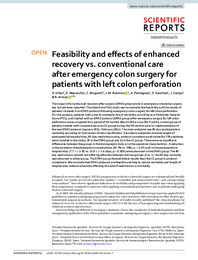Por favor, use este identificador para citar o enlazar este ítem:
https://hdl.handle.net/11000/31121
Feasibility and efects of enhanced recovery vs. conventional care after emergency colon surgery for patients with left colon perforation
Título :
Feasibility and efects of enhanced recovery vs. conventional care after emergency colon surgery for patients with left colon perforation |
Autor :
Viñas, X.
Macarulla, E.
Brugiotti, C.
Ramirez, J.M.
Pedregosa, A.
Sanchez, S.
Camps, J.
Arroyo, Antonio  |
Editor :
Nature portfolio |
Departamento:
Departamentos de la UMH::Patología y Cirugía |
Fecha de publicación:
2020-04 |
URI :
https://hdl.handle.net/11000/31121 |
Resumen :
The impact of an enhanced recovery after surgery (ERAS) programme in emergency colorectal surgery has not yet been reported. The objective of this study was to evaluate the feasibility and the results of patients included in an ERAS protocol following emergency colon surgery for left colon perforation. For this purpose, patients with a low to moderate risk of mortality, according to a Peritonitis Severity Score (PSS), and treated with an ERAS protocol (ERAS group) after emergency surgery for left colon perforation were compared for a period of 40 months (March 2014–June 2017) with a control group of patients treated with conventional care (CC group) during the 38 months prior to implementation of the new ERAS protocol (January 2011–February 2014). The main endpoint was 90-day postoperative morbidity according to the Clavien–Dindo classification. Secondary endpoints included length of postoperative hospital stay, 90-day readmission rate, protocol compliance and mortality. Fifty patients were included in the study, 29 in the ERAS group and 21 in the CC group. There were no significant differences between the groups in the demographic data or in the operative characteristics. A reduction in the incidence of postoperative complications (20.7% vs. 38%; p > 0.05) and in the postoperative hospital stay (7.7 + /- 3.85 vs. 10.9 + /- 5.6 days; p = 0.009) were observed in the ERAS group. The 90-day readmission rate did not differ significantly between the two groups (2 vs. 1). No 90-day mortality was observed in either group. The ERAS group showed better results than the CC group in protocol compliance. We conclude that ERAS protocols are feasible and help to reduce morbidity and length of hospital stay without adversely affecting the rate of readmission or mortality.
|
Área de conocimiento :
CDU: Ciencias aplicadas: Medicina: Patología. Medicina clínica. Oncología |
Tipo documento :
application/pdf |
Derechos de acceso:
info:eu-repo/semantics/openAccess |
DOI :
https://doi.org/10.1038/s41598-020-64242-7 |
Aparece en las colecciones:
Artículos Patología y Cirugía
|
 La licencia se describe como: Atribución-NonComercial-NoDerivada 4.0 Internacional.
La licencia se describe como: Atribución-NonComercial-NoDerivada 4.0 Internacional.
 La licencia se describe como: Atribución-NonComercial-NoDerivada 4.0 Internacional.
La licencia se describe como: Atribución-NonComercial-NoDerivada 4.0 Internacional.
.png)
